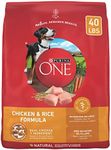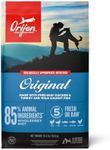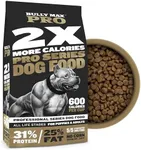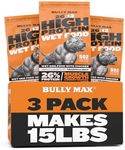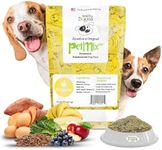Buying Guide for the Best Dog Foods
Choosing the right dog food is crucial for your pet's health and well-being. The right food can help maintain a healthy weight, support a shiny coat, and provide the energy your dog needs. When selecting dog food, it's important to consider your dog's age, size, breed, and any specific health concerns. Here are some key specifications to help you make an informed decision.IngredientsIngredients are the building blocks of dog food and determine its nutritional value. High-quality ingredients like real meat, vegetables, and whole grains are essential for a balanced diet. Avoid foods with fillers, artificial preservatives, and by-products. Look for foods where the first ingredient is a named meat source, such as chicken or beef, as this indicates a higher quality product.
Protein ContentProtein is vital for your dog's muscle development and overall health. The protein content in dog food is usually listed as a percentage. Puppies and active dogs require higher protein levels (around 25-30%), while adult and senior dogs may need less (18-25%). Choose a protein level that matches your dog's life stage and activity level.
Fat ContentFat provides energy and supports healthy skin and coat. The fat content in dog food should be balanced; too much can lead to obesity, while too little can cause dry skin and a dull coat. Puppies and active dogs need higher fat content (around 15-20%), while adult and senior dogs need less (10-15%). Select a fat level appropriate for your dog's age and activity level.
Life StageDog foods are often formulated for specific life stages: puppy, adult, and senior. Puppies need food with higher protein and fat for growth, adults need balanced nutrition for maintenance, and seniors need fewer calories and more fiber to support aging bodies. Choose a food that matches your dog's current life stage to ensure they get the right nutrients.
Breed SizeDifferent breeds have different nutritional needs. Small breed dogs often require more calorie-dense food due to their higher metabolism, while large breed dogs need food that supports joint health and prevents obesity. Look for dog food formulated specifically for your dog's breed size to ensure they get the appropriate nutrients.
Allergies and SensitivitiesSome dogs have food allergies or sensitivities that can cause digestive issues or skin problems. Common allergens include beef, dairy, wheat, and chicken. If your dog has allergies, look for hypoallergenic or limited ingredient diets that avoid common allergens. Always consult your vet if you suspect your dog has food sensitivities.
Nutritional Adequacy StatementThis statement, often found on the dog food packaging, indicates that the food meets the nutritional levels established by the AAFCO (Association of American Feed Control Officials). This ensures the food provides complete and balanced nutrition for your dog's life stage. Always choose dog food with this statement to ensure your pet is getting the necessary nutrients.


